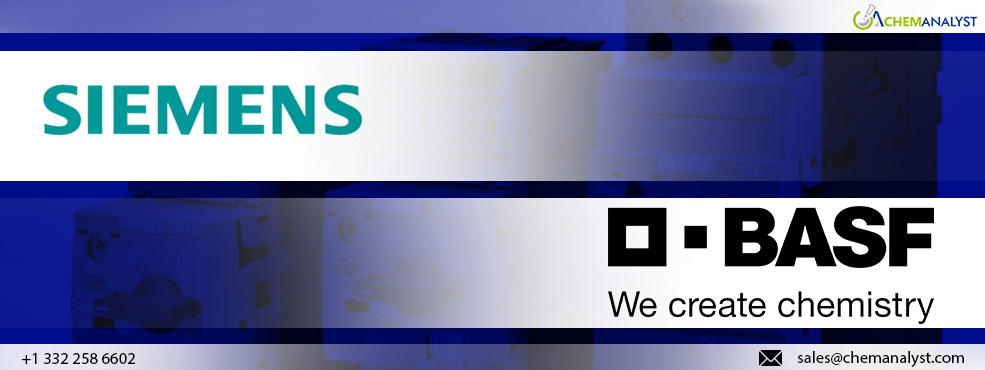Welcome To ChemAnalyst

Siemens Smart Infrastructure and BASF have jointly unveiled the first electrical safety product incorporating components crafted from biomass-balanced plastics. Utilized in various industrial and infrastructure settings, the Siemens SIRIUS 3RV2 circuit breaker now integrates Ultramid® BMBcertTM and Ultradur® BMBcertTM materials from BASF. These materials utilize biomethane derived from renewable sources like agricultural waste, replacing fossil feedstock at the initial stages of production. Despite the material shift, both Ultramid® BMBcertTM and Ultradur® BMBcertTM maintain the same level of quality and performance as traditional plastics. This transition in the production of the SIRIUS 3RV2 circuit breaker is estimated to curtail carbon dioxide emissions by approximately 270 tons annually. Customers adopting these products play a pivotal role in fostering a circular economy and advancing towards a more sustainable future.
This initiative aligns with Siemens' sustainability objectives concerning decarbonization and resource efficiency, as outlined in its DEGREE framework. The company is committed to a science-based decarbonization target of 1.5°C, which includes a 90 percent reduction goal for scope 1 and 2 emissions by 2030. Additionally, Siemens aims to implement a Robust Eco Design for 100 percent of relevant product families by 2030.
In the upcoming months, Siemens plans to expand the incorporation of sustainable materials across its broader SIRIUS industrial controls portfolio. Apart from influencing product design, features, manufacturing, and supply processes, the selection of materials significantly contributes to further reductions in carbon emissions and the preservation of natural resources. The SIRIUS 3RV2 circuit breaker aligns with the stringent criteria of the recently introduced Siemens EcoTech label, providing customers with comprehensive insights into product performance across specific environmental parameters. Alongside the majority of the product housing and functional components being crafted from biomass-balanced plastic, the product also boasts lower power consumption throughout its lifespan compared to its predecessor.
"Andreas Matthé, CEO of Electrical Products at Siemens Smart Infrastructure, stated, 'Our products enable customers to enhance asset performance, availability, and reliability by offering resource-efficient and circular solutions that optimize energy consumption, production, and supply chains across their entire lifecycle. Partnering with BASF provides us with invaluable support through its innovations in sustainable plastics.'"
BASF is dedicated to contributing to the circular economy and reducing fossil fuel dependence by increasingly incorporating renewable and recycled materials in its product manufacturing process. This transition involves gradually substituting fossil-based raw materials with bio-based and recycled feedstock. Following a mass balance approach, renewable or recycled materials are integrated into production at the outset of BASF's intricate value chains. Opting for a certified product from such a value chain prompts BASF to introduce sustainable raw materials into its ongoing production within the BASF Verbund.
Martin Jung, President of BASF Performance Materials, elaborates, "The mass balance approach presents a transformative solution that facilitates the gradual substitution of fossil-based materials in intricate production processes. The merits of this approach are evident, and as demand for alternative products increases, so does the incorporation of alternative raw materials within the production network. This aligns seamlessly with our objective of attaining a circular economy and achieving net-zero operations at the earliest opportunity. Moreover, what sets this project apart is the utilization of the SIRIUS 3RV2 circuit breaker within our BASF production facilities. This circuit breaker not only safeguards the motors but also enhances their efficiency and reliability, thereby making a dual contribution to our sustainability goals."
Through the mass balance approach, a range of alternative raw materials, including biomethane, bio-naphtha, or pyrolysis oil, can be incorporated into the value chain. BASF ensures that the bio-naphtha and biomethane utilized in its processes are certified as sustainable by established systems such as ISCC PLUS and REDcert. The integration of the SIRIUS 3RV2 circuit breaker serves as evidence of resource-efficient plastics production and marks a significant milestone on BASF's #ourplasticsjourney.
Andreas Matthé emphasizes, "The incorporation of such an innovative material into a critical safety component, while maintaining its safety functionality and performance, represents a distinctive accomplishment for Siemens."
Circuit breakers are employed in factories and buildings globally to safeguard machines or electrical cables in the event of faults like short circuits, thereby averting significant damage, including fires. The SIRIUS 3RV2 circuit breaker, featuring sustainable plastic components, will debut at Siemens' booth E3 in Hall 11 during the ACHEMA trade fair in Frankfurt from June 10 to 14, 2024.
We use cookies to deliver the best possible experience on our website. To learn more, visit our Privacy Policy. By continuing to use this site or by closing this box, you consent to our use of cookies. More info.
